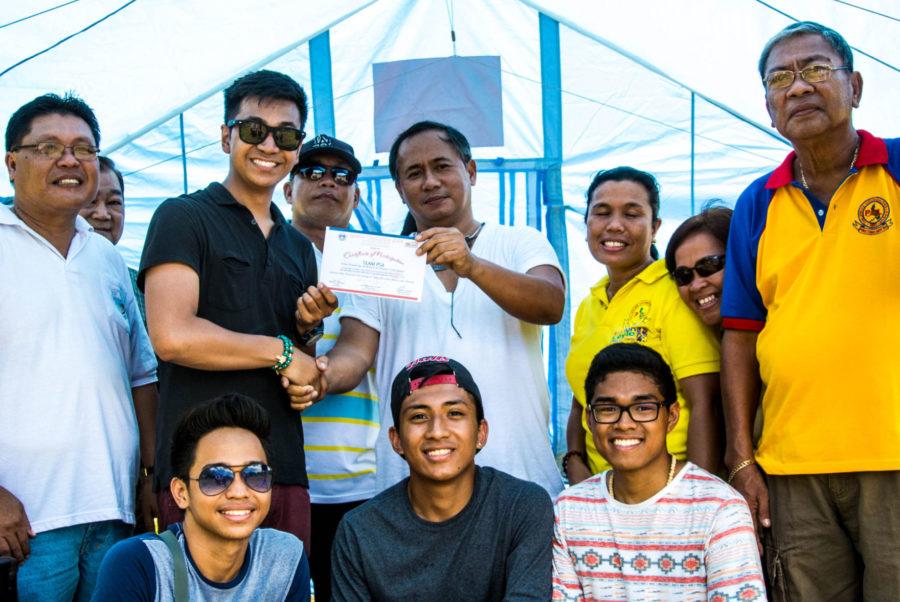University students go to the Philippines for Typhoon Relief
September 2, 2014
The blow of Typhoon Haiyan affected millions of people in the Philippines after it first hit on November 8, 2013.
Thousands lost their lives, and hundreds of thousands of homes were destroyed, leaving families to search through the rubble of the storm’s aftermath, trying to piece their lives back together.
The world did not stay silent though, and organizations from across the globe rushed to establish relief efforts for the typhoon’s victims.
The University’s Philippine Student Association (PSA) was no exception.
In June, three volunteers from the organization, as well as two additional volunteers in the Philippines, traveled to the affected areas of Leyte and San Remigio, in the Cebu province. They then took part in a service trip to aid typhoon victims and to help rebuild after massive destruction.
Get The Daily Illini in your inbox!
The organization raised $3,000 for the Philippine Red Cross, with the help of an organization called Advancement for Rural Kids, which does philanthropic work in the Philippines.
Walbert Castillo, junior in Media, was philanthropy chair for PSA and the organizer of the trip. He reached out to a Filipino organization called Gawad Kalinga to help plan the trip. The organization’s name translated to English means to “give care”, according to its website.
The volunteers took off to spend two weeks helping with relief efforts at the beginning of the summer.
They built houses and planted mangrove trees, which “are structured into the ground so if future natural disasters hit, they can stop the wreckage from soil erosion so it doesn’t do as much damage,” Castillo said.
They also took part in a program called Paraisong Pambata, or Paradise for the Children, which involves spending time with children, reading to them and singing to them, according to Castillo.
This trip was the first time volunteer Jason Lamano, junior in LAS, went to the Philippines. By immersing himself in a society where people had less, he was able to observe and come to appreciate a different way of life.
“It’s a very simplistic lifestyle; I think it’s something we all should embrace at some point in our lives,” Lamano said. “It’s a change of pace from campus life, a change of pace from professional life and academic life.”
Lamano’s uncle, a dentist, also provided the volunteers with toothbrushes, toothpaste and floss to donate to the Department of Social Welfare and Development in Manila.
Volunteer Eric Ordonez, junior in Engineering, said he remembers villagers of all ages crying as the volunteers said their goodbyes when leaving the first site in Leyte.
“You hear a lot about relief efforts,” he said. “People say, ‘So-and-so donated so-and-so million dollars.’ But you can see that really what touches the people who receive this aid most is the human contact. It’s not about the money, it’s not about the goods they get, but the fact that people give themselves.”
When the storm ended, approximately 4.1 million people were displaced, 1.1 million homes were destroyed and 6,300 people were dead, according to the U.S. Aid website. But the incident was a testament to the unity and services that often ensue after a disaster.
“Before the typhoon even started, I wanted to do something for the Philippines; I wanted to give back,” Castillo said. “But unfortunately, the typhoon hit. But it was, I would say, a blessing in God’s disguise, because it just tremendously shows how much work we can put toward one country for help and service.”
The PSA volunteers said they gained new perspectives and a renewed sense of appreciation for their backgrounds after embarking on the trip.
“The experience was beautiful,” Castillo said. “You don’t really grasp the entity of the Philippines if you haven’t been there, and I hadn’t been to the Philippines in 15 years. I am appreciating my own culture because I delved into it.”
Ordonez said being born in the U.S. did not subdue his sense of duty to his fellow Filipinos.
“I was born here, but that’s still who I am,” he said. “That’s the culture I come from. That’s in my blood. I have to go back to (help); it’s on me.”
Sleeping on plywood and living without electricity left an impact on Castillo as he recognized the privileges he had living in the U.S. He said another memorable part of the trip was seeing the resilience and optimism of the people who were affected by the disaster.
“People in the Philippines, even though they were struck horribly by this typhoon, they still have the resilience,” Castillo said. “They still have hope in all of darkness. They’re still willing to come together as one to help out with the wreckage.”
Abrar can be reached at [email protected].







